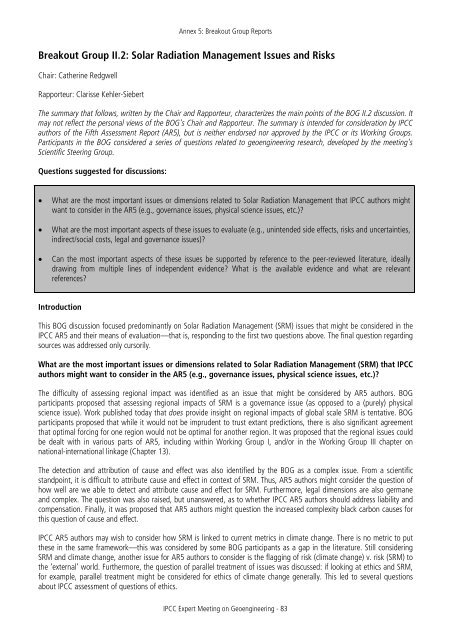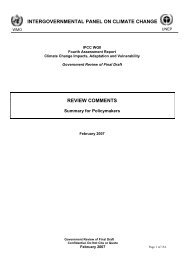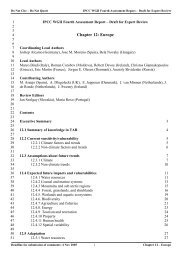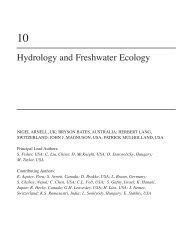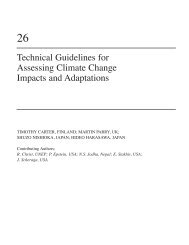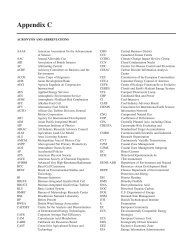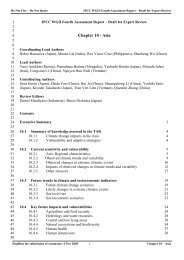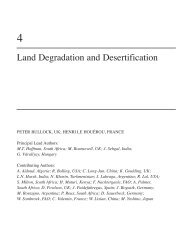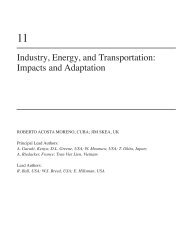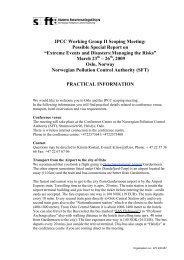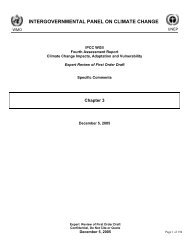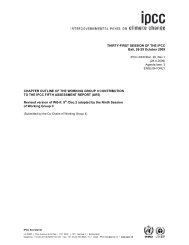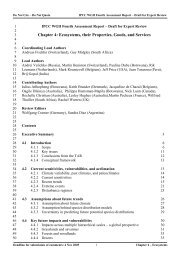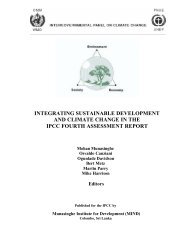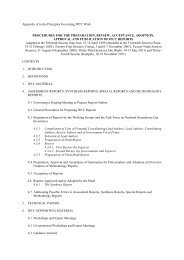IPCC Expert Meeting on Geoengineering
IPCC Expert Meeting on Geoengineering
IPCC Expert Meeting on Geoengineering
Create successful ePaper yourself
Turn your PDF publications into a flip-book with our unique Google optimized e-Paper software.
Annex 5: Breakout Group Reports<br />
Breakout Group II.2: Solar Radiati<strong>on</strong> Management Issues and Risks<br />
Chair: Catherine Redgwell<br />
Rapporteur: Clarisse Kehler-Siebert<br />
The summary that follows, written by the Chair and Rapporteur, characterizes the main points of the BOG II.2 discussi<strong>on</strong>. It<br />
may not reflect the pers<strong>on</strong>al views of the BOG’s Chair and Rapporteur. The summary is intended for c<strong>on</strong>siderati<strong>on</strong> by <str<strong>on</strong>g>IPCC</str<strong>on</strong>g><br />
authors of the Fifth Assessment Report (AR5), but is neither endorsed nor approved by the <str<strong>on</strong>g>IPCC</str<strong>on</strong>g> or its Working Groups.<br />
Participants in the BOG c<strong>on</strong>sidered a series of questi<strong>on</strong>s related to geoengineering research, developed by the meeting’s<br />
Scientific Steering Group.<br />
Questi<strong>on</strong>s suggested for discussi<strong>on</strong>s:<br />
<br />
<br />
<br />
What are the most important issues or dimensi<strong>on</strong>s related to Solar Radiati<strong>on</strong> Management that <str<strong>on</strong>g>IPCC</str<strong>on</strong>g> authors might<br />
want to c<strong>on</strong>sider in the AR5 (e.g., governance issues, physical science issues, etc.)?<br />
What are the most important aspects of these issues to evaluate (e.g., unintended side effects, risks and uncertainties,<br />
indirect/social costs, legal and governance issues)?<br />
Can the most important aspects of these issues be supported by reference to the peer-reviewed literature, ideally<br />
drawing from multiple lines of independent evidence? What is the available evidence and what are relevant<br />
references?<br />
Introducti<strong>on</strong><br />
This BOG discussi<strong>on</strong> focused predominantly <strong>on</strong> Solar Radiati<strong>on</strong> Management (SRM) issues that might be c<strong>on</strong>sidered in the<br />
<str<strong>on</strong>g>IPCC</str<strong>on</strong>g> AR5 and their means of evaluati<strong>on</strong>—that is, resp<strong>on</strong>ding to the first two questi<strong>on</strong>s above. The final questi<strong>on</strong> regarding<br />
sources was addressed <strong>on</strong>ly cursorily.<br />
What are the most important issues or dimensi<strong>on</strong>s related to Solar Radiati<strong>on</strong> Management (SRM) that <str<strong>on</strong>g>IPCC</str<strong>on</strong>g><br />
authors might want to c<strong>on</strong>sider in the AR5 (e.g., governance issues, physical science issues, etc.)?<br />
The difficulty of assessing regi<strong>on</strong>al impact was identified as an issue that might be c<strong>on</strong>sidered by AR5 authors. BOG<br />
participants proposed that assessing regi<strong>on</strong>al impacts of SRM is a governance issue (as opposed to a (purely) physical<br />
science issue). Work published today that does provide insight <strong>on</strong> regi<strong>on</strong>al impacts of global scale SRM is tentative. BOG<br />
participants proposed that while it would not be imprudent to trust extant predicti<strong>on</strong>s, there is also significant agreement<br />
that optimal forcing for <strong>on</strong>e regi<strong>on</strong> would not be optimal for another regi<strong>on</strong>. It was proposed that the regi<strong>on</strong>al issues could<br />
be dealt with in various parts of AR5, including within Working Group I, and/or in the Working Group III chapter <strong>on</strong><br />
nati<strong>on</strong>al-internati<strong>on</strong>al linkage (Chapter 13).<br />
The detecti<strong>on</strong> and attributi<strong>on</strong> of cause and effect was also identified by the BOG as a complex issue. From a scientific<br />
standpoint, it is difficult to attribute cause and effect in c<strong>on</strong>text of SRM. Thus, AR5 authors might c<strong>on</strong>sider the questi<strong>on</strong> of<br />
how well are we able to detect and attribute cause and effect for SRM. Furthermore, legal dimensi<strong>on</strong>s are also germane<br />
and complex. The questi<strong>on</strong> was also raised, but unanswered, as to whether <str<strong>on</strong>g>IPCC</str<strong>on</strong>g> AR5 authors should address liability and<br />
compensati<strong>on</strong>. Finally, it was proposed that AR5 authors might questi<strong>on</strong> the increased complexity black carb<strong>on</strong> causes for<br />
this questi<strong>on</strong> of cause and effect.<br />
<str<strong>on</strong>g>IPCC</str<strong>on</strong>g> AR5 authors may wish to c<strong>on</strong>sider how SRM is linked to current metrics in climate change. There is no metric to put<br />
these in the same framework—this was c<strong>on</strong>sidered by some BOG participants as a gap in the literature. Still c<strong>on</strong>sidering<br />
SRM and climate change, another issue for AR5 authors to c<strong>on</strong>sider is the flagging of risk (climate change) v. risk (SRM) to<br />
the ‘external’ world. Furthermore, the questi<strong>on</strong> of parallel treatment of issues was discussed: if looking at ethics and SRM,<br />
for example, parallel treatment might be c<strong>on</strong>sidered for ethics of climate change generally. This led to several questi<strong>on</strong>s<br />
about <str<strong>on</strong>g>IPCC</str<strong>on</strong>g> assessment of questi<strong>on</strong>s of ethics.<br />
<str<strong>on</strong>g>IPCC</str<strong>on</strong>g> <str<strong>on</strong>g>Expert</str<strong>on</strong>g> <str<strong>on</strong>g>Meeting</str<strong>on</strong>g> <strong>on</strong> <strong>Geoengineering</strong> - 83


